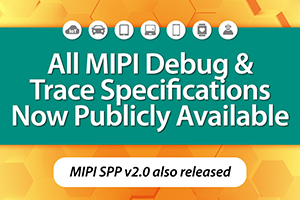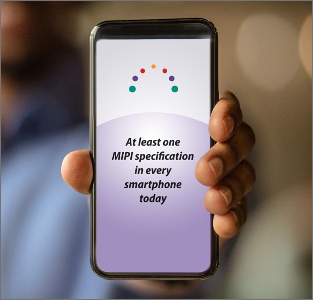2 min read
MIPI Alliance Releases Debug and Trace Specifications to Developers
![]() Enrico Carrieri, Chair of the MIPI Debug Working Group
:
12 September 2019
Enrico Carrieri, Chair of the MIPI Debug Working Group
:
12 September 2019

- News & Events
- News
- Blog
The MIPI Alliance's broad portfolio of debug and trace specifications has streamlined device development both in and beyond the mobile industry. MIPI Alliance members that have adopted these specifications as alternatives to using dedicated debug and trace equipment have cut costs and accelerated the development of high-quality products.
Now developers, regardless of company membership in MIPI Alliance, can take advantage of these benefits: All MIPI debug and trace specifications have been made publicly available for download. We're taking this step to foster greater interoperability and a richer development environment. MIPI Alliance’s software specifications, which help to streamline the software integration of components in mobile devices and other systems, are also publicly available.
MIPI debug and trace specifications provide a standard, layered set of interfaces and protocols to address debug requirements specific to mobile devices and beyond. This release covers nine specifications, making the entire portfolio publicly available.
| Specification | Description |
| MIPI SneakPeek Protocol (MIPI SPPSM) v2.0 | Newly updated standard communications protocol for debug and test applications |
| MIPI System Software-Trace (MIPI SyS-TSM) | Universal data format for transmitting software debug and trace information between a test system and a device |
| MIPI Narrow Interface for Debug and Test (MIPI NIDnTSM) | Specification for using functional ports on a device for debug and testing of finished products |
| MIPI System Trace Protocol (MIPI STPSM) | Generic base protocol for trace functions that can be shared by multiple application-specific trace protocols |
| MIPI Trace Wrapper Protocol (MIPI TWPSM) | Protocol for merging multiple source trace streams into a single trace stream |
| MIPI High-Speed Trace Interface (MIPI HTISM) | Serial implementation of data port for higher transmit bandwidth with fewer I/O pins compared with a parallel implementation |
| MIPI Parallel Trace Interface (MIPI PTISM) | Parallel interface with multiple data signals and a clock for exporting data about system functionality and behavior |
| MIPI Gigabit Debug for USB (MIPI GbD USBSM) | Adapter for using MIPI SPP and MIPI TWP over USB connections |
| MIPI Gigabit Debug for IP Sockets (MIPI GbD IPSSM) | Adapter for using MIPI SPP and MIPI TWP over IP Sockets for remote debugging over Wi-Fi or Ethernet connections |
SPP v2.0 and TinySPP
In conjunction with the public release of the specifications, we're introducing a new version of SneakPeek to help developers debug small devices such as sensors. The new version, MIPI SPP v2.0, includes TinySPP, a style of the protocol that is optimized for low-bandwidth and potentially high-latency interfaces.
MIPI TinySPP special features include:
- Shorter minimum packet length of 4 bytes instead of 16 bytes
- Smaller transaction byte field of 7 bits instead of 16 bits
- Short addressing system that reduces 64-bit or 32-bit addresses to 6 bits where possible
- Defines packetized JTAG messaging, which reduces the overhead involved in using JTAG to change state
MIPI SPP v2.0 is available for download along with the other debug and trace specifications. Companies that would like to contribute to the development of new specifications like SPP v2.0 can join MIPI Alliance and enjoy other benefits, including participation in interoperability workshops and other events.






